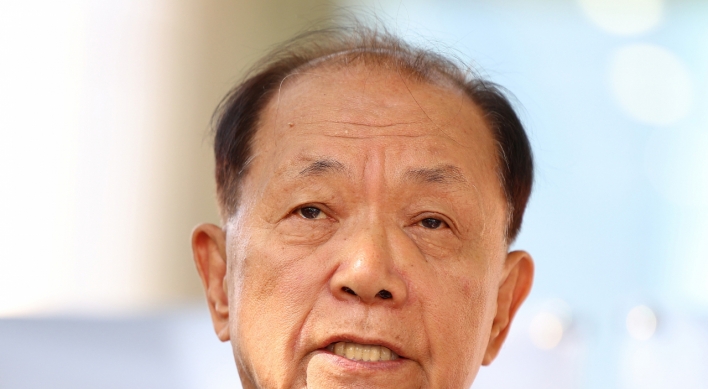Ruling, opposition parties in negotiations over legislative reform bill
Stung by public criticism, rival political parties on Wednesday sought to break a deadlock on legislative-process reforms and pass some other important bills before the current parliament ends its term.
Leaders of the ruling Saenuri Party and the main opposition Democratic United Party, after rounds of behind-the-scene negotiations, reached a compromise deal on the bill aimed at promoting compromise and preventing violent clashes by lawmakers on the floor.
The leaders, however, must win a nod from the rank-and-file lawmakers before they can officially announce a breakthrough.
“Saenuri floor leader Rep. Hwang Woo-yea made a new proposal and we accepted it,” Rep. Park Yong-jin, the DUP’s spokesperson, told reporters.
Stung by public criticism, rival political parties on Wednesday sought to break a deadlock on legislative-process reforms and pass some other important bills before the current parliament ends its term.
Leaders of the ruling Saenuri Party and the main opposition Democratic United Party, after rounds of behind-the-scene negotiations, reached a compromise deal on the bill aimed at promoting compromise and preventing violent clashes by lawmakers on the floor.
The leaders, however, must win a nod from the rank-and-file lawmakers before they can officially announce a breakthrough.
“Saenuri floor leader Rep. Hwang Woo-yea made a new proposal and we accepted it,” Rep. Park Yong-jin, the DUP’s spokesperson, told reporters.

The so-called National Assembly advancement bill intends to limit the parliamentary speaker’s authority to put a bill to a final floor vote, bypassing committee-level procedures, a measure often used by the majority party to ram through controversial bills despite the opposition of smaller parties. Instead, it would introduce a filibuster and other measures to fast track votes on long-standing bills.
The governing Saenuri Party sought to water it down, out of fear that the proposed measures would make it too difficult to pass controversial bills. The DUP insisted on no major alterations.
Rep. Hwang’s proposal, however, intends to soften the requirements for fast-track votes by adding that a consensus of representatives of parliamentary blocs, or three-fifths of the Assembly, can send bills, which have been sitting at the National Assembly’s Legislation and Judiciary Committee, the last stop before a floor vote, for more than 120 days, to the voting session.
“I will do my best to win support from our party’s legislators,” Rep. Hwang said.
The compromise deal came after public criticism that the 18th National Assembly, punctuated by endless partisan wrangling and violent scuffles on the floor featuring a chain saw, sledgehammer and even a tear gas bomb, is neglecting key bills until the end of its four-year term.
The Assembly ends its term on May 29. Bills that do not pass the legislature before then will be automatically scrapped.
On Tuesday, the lawmakers cancelled what was expected to be their final plenary session, scheduled in Tuesday afternoon, after they failed to narrow their differences over the legislative reform bill.
The decision darkened prospects for nearly 60 other pending bills, including one to permit sales of over-the-counter drugs at convenience stores and another to allow police to trace the location of crime victims without a warrant.
DUP lawmakers blamed Saenuri for the impasse, which stymied efforts to pass some of the most important bills before the end of the parliamentary term.
“The Saenuri Party, after its better-than-expected performance in the parliamentary elections, made an about-face, demanding significant changes to the bill, which it initiated,” said Rep. Park Yong-jin, the party’s spokesperson.
In February, when the Saenuri didn’t expect a majority in the next parliament, its leaders pressed for bipartisan support for the bill, which is unfavorable to the majority-holding party, he pointed out.
In the April 11 parliamentary election, the Saenuri eked out a surprise win, bagging 152 of the 300 seats up for grabs. Its presence in the looming 19th Assembly has been reduced to 150, one seat short of a simple majority, after two lawmakers-elect left the party amid scandals.
(Rep. Kim Jin-pyo, the DUP’s floor leader, called for another voting session to handle the legislative reform bill and others.
Saenuri chief Park Geun-hye said: “I think we should try again to hold a plenary session before the parliamentary term expires and handle the bill to advance the parliamentary process.”
Yet, it remains to be seen whether the parties will be able to strike an accord on the legislative reform bill, and even in such a case, pull together a voting session.
Nearly 60 percent of the 299 incumbent lawmakers must vacate their parliamentary seats, because they were not re-elected. Furthermore, the political focus is already shifting to intra-party leadership races and the presidential nomination race.
Major parties are to elect new leaders who will guide them into the presidential election in December.
By Lee Sun-young (milaya@heraldcorp.com)
-
Articles by Korea Herald







![[KH Explains] No more 'Michael' at Kakao Games](http://res.heraldm.com/phpwas/restmb_idxmake.php?idx=644&simg=/content/image/2024/04/28/20240428050183_0.jpg&u=20240428180321)











![[Herald Interview] Mistakes turn into blessings in street performance, director says](http://res.heraldm.com/phpwas/restmb_idxmake.php?idx=652&simg=/content/image/2024/04/28/20240428050150_0.jpg&u=20240428174656)
